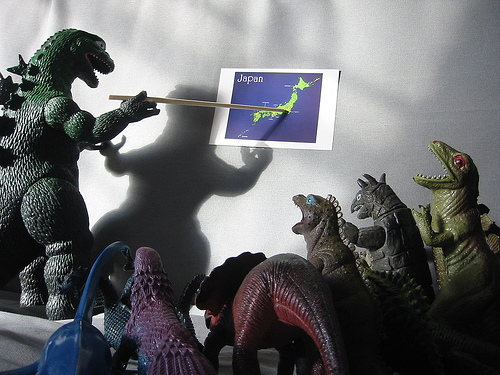image by worldislandinfo
Some of the very best artists I have ever met were amazing teachers. They were artists who were absolutely consumed by the passion of what they do. I had a professor in college, Jerry Gardner, who was a brilliant physical actor. He had years of experience in ballet, Butoh, Commedia del’arte, mask performance, and a host of other talents. He was also a Buddhist Llama. In college we always joked about how one day we were going to walk into class and find him levitating above the floor in lotus position…but I digress.
One of the very first posts I wrote on this site was about how it’s a misconception that artists who can’t ‘make it’ go into teaching. That may be true to a certain extent, but it is just as true, from my experience, that the best teachers are often the best artists.
Why bring it up? Well, it’s a pet peeve of mine, but that’s not really why I’m bringing it up.
Here’s the part where people start getting out their ugly-sticks (for the beatings). Teaching is a viable career – oh, I don’t mean in the secondary school/university/junior college sense. I mean really teaching people, in the out-in-the-world, showing people how it’s really done, give them some practical advice that will help them do something NOW kind of way.
I mean that there are artists out there who are absolutely amazing, and we can learn a ton from them – but they’ll never be found in an academic setting. They’re too busy creating and selling their work. They’re too busy moving on to the next big project. They don’t see any value in being a part of the academic system – a system that often fails its young artists.
Yesterday a friend of mine asked me how much business training artists get while they’re in college. I told him none. That was my experience. Oh, sure, I got to meet some important people, and I got to learn how the system is supposed to work (do good work, meet an agent, get gigs, etc). I had to go outside of my college experience to learn the rest, though, and that’s where the stuff that was actually commercially viable came. That’s how I make a living.
To be sure, the value of the technique I learned was crucial – I wouldn’t be where I’m at today without that technique. I needed more training though, especially on how artists who are actually making a living today, in our time. Harold Phillips should be teaching college – but he never will because he’s too busy hustling. Natasha Westcoat should be teaching college – but she’s too busy selling her work to all of her fans and driving free cars that Ford gives her.
So what do you think? Where should we be looking for teachers?

your tweet and this post reminded me right away of my colleague Neil McKenzie who has a successful Photography business in Denver, an excellent track record as a management consultant and adds value on and offline. He teaches Artrepreneurship at the Center for Innovation at Metropolitan State College of Denver. He is VERY effective because of his success out of class in the past, present and future. I like to see these kind of teachers in life and watch them grow as a result of teaching. BTW, I know he is effective because his students tell us in the community and I have been presented some business plans…required for 1/2 of the students grade! We need more like this. Keep up the good work.
David, I have seen a LOT of local organizations teaching Arts entrepreneurship – yet, most artists still have no idea how to run a business. Has it just not reached a critical mass yet? How do we get the word out to artists that this training is available?
we are a four year degree with major, minor and certificates. It is much more than the excellent class I mentioned. Another example is the class I teach, creative problem solving:
http://www.kdvr.com/videobeta/watch/?watch=33323233-40e8-4414-a141-d6b12c5e5711
How do we get the word out? That is what I and my fellow founding board members are doing. Starting in Denver.
Not exactly the same, but I’ve been thinking the past few days about how to adopt the charter school model for the theatre. How to abandon the bureaucracy and focus again on the art. How to attract young artists/administrators with energy and passion and new ideas. How to be an incubator for ideas that bigger institutions could actually deploy. How to make a structure that is replicable at least regionally if not nationally, flexible enough to adapt to local circumstances. The similarities between artists and teachers are many, as are the issues facing schools and theatres.
Oh, Devon, the more I read your writing the more I’m convinced we are of one mind. I could, and should, write a lengthy blog post on the very thing you are proposing. A small theatre company somewhere that had a training program attached to it that showed actors how to make a living…you should check out Jim Hart’s Austin Conservatory of Professional Arts. He’s trying to do just that.
ACPA is interesting. Austin’s my home town, and I’ve always been surprised by the under-representation of theatre, given its huge population of (musical) artists. If you’ll write a post re: the charter school model, I’ll counter-post 🙂
College failed me for jazz. Robert conti teaches a very practical approach by getting lines under your fingers to start with.
You should be looking for teachers everywhere. You can learn from successful artists, successful business people and people in general. I tell my students to get out and experience life. Hang around people who are smater than you, hang around people that are interesting, hang around your customers.
The idea you talk about is no different for graduates of business programs. No Starving Artists – right on!